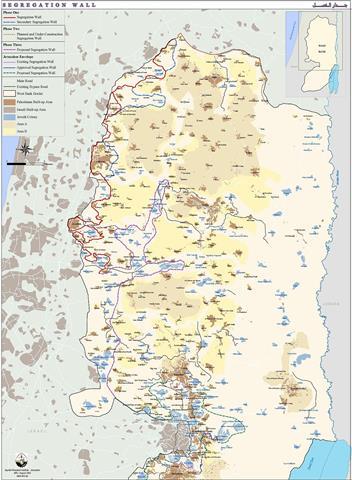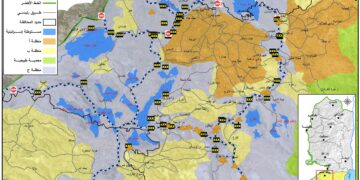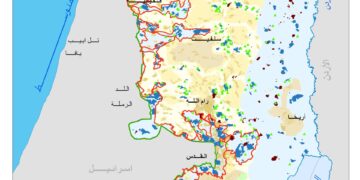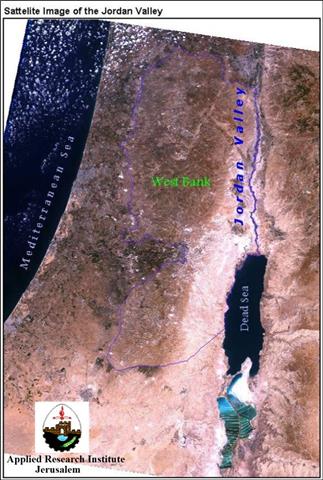Since June 2002, the Israeli government decided to commence the construction of the Segregation Wall in the Occupied West Bank. The reason behind this barrier, according to the Israeli Authorities, is 'security', while it can be analyzed from maps and fieldworks that it is a political barrier rather than any other reason. Jayyous village is a typical example that shows how the Israeli authorities aim at depriving the Palestinian population from their main source of living which is their land. See map of the Wall.
Jayyous village is located northeast of Qalqilya city and lie close to the illegal Israeli settlement of Zufin. The inhabited built-up area of the village is 490.6 dunums (ARIJ GIS database, 2003) of a population 2,927 approximately ( PCBS,2002); whereas, the isolated land to the west of the Segregation Wall from Jayyus village is 8374.59 dunums ( ARIJ GIS database 2003). See map of location.
Nowadays, Jayyous village is facing one of the most difficult situations since it is deprived from its agricultural land. The Palestinian landowners are considering their land as the main source of income, and for that reason, they insist on having access to their land. The Israeli Occupation Forces -IOF- left few gates along the trajectory of the Wall in order to tell the international community that the Israeli government allows farmers to access their land. However, the opening of these gates is the main problem for farmers as the Israeli army open them for a limited time during the day. Many times the gates are closed all the day, and when opened, only for 1 hour in the morning and 1 hour in the evening. Recently, they are opened for only 15 minutes for no obvious reasons. See photo of gates at Jayyous, Photo 1 & Photo 2.
Despite the fact that the gates are closed in most cases, the Palestinian farmers are decisive to cultivate and use their land. Insisting on their rights to access their lands, there are 32 families from Jayyous village who camp in their lands for the whole week and only return home once. Those families are living in difficult conditions for the sake of guarding their land from being confiscated or seized by the Israeli army. The Israeli government benefits from an old law issued in 1884 during the Ottoman period, which the government utilizes as a tool for land grab, and a right to declare the land as a state land in case the land is not used by the owner. For that reason, the Palestinian landowners have to cultivate their lands to prove and to protect their ownership.
The Family of Yousef Faleh Shamasneh is one of the families that are camping in their land to west of the wall and are living a daily suffering. The family spends the whole week taking care of the crops, and returns back home in the village of Jayyous after a long week of hard working. The idea of passing the gates is not always easy especially in the process of transferring part of the mature crops. Many times the Israeli army ask the people to throw their crop or they don't allow for the completion of the transfer process. Besides, farmer are sometimes humiliated physically by the soldiers as explained to ARIJ fieldworkers. See Photo 3.
Abu Azam is considered as the head of farmers in Jayyous village, his best crop is the loquats. His crops if not maintained during the year, he will loose his source of income, and for that reason he finds himself obliged to leave his home and family in order to take care of his land which is most valued to him. See Photo 4 Photo 5
Jayyous village is reflecting the suffering of villages that are located east of the Segregation wall and isolated west of the barrier. Until recently, farmers of Jayyous village are still facing difficulties to reach their lands; nevertheless, the big question will be if those people will always be the landowners in the future.
Prepared by:
The Applied Research Institute – Jerusalem





















